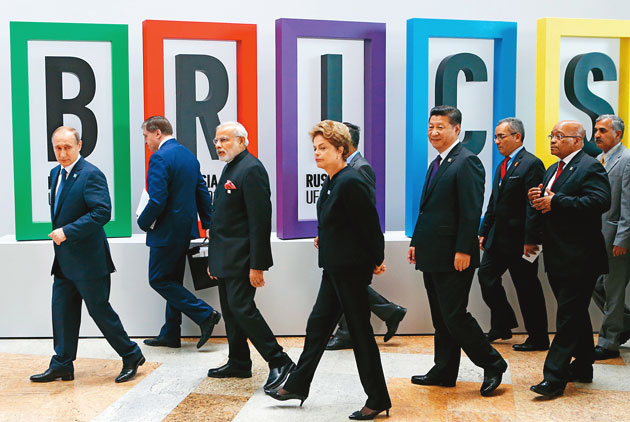Chairman of The Bank of China
Opinion: BRICS Must Lead Way in New Era of Globalization

Source:Photo of The 7th BRICS Summit from Shutterstock/REUTERS
Today, although trade protectionism is rising, globalization is still the mainstream of public opinion. At this point, the BRICS countries should promote globalization and encourage more international cooperation.
Views
Opinion: BRICS Must Lead Way in New Era of Globalization
By Chen Siqingweb only
Ten years ago, when a financial crisis took down the world’s economy, as representatives of emerging economies, the BRICS countries worked together to cope with the crisis and improve global governance.
Today, although trade protectionism is rising, globalization is still the mainstream of public opinion. At this point, the BRICS countries should promote globalization and encourage more international cooperation.
Historically, protectionism and free trade always alternate. The predecessor of the World Trade Organization (WTO), the General Agreement on Tariffs and Trade (GATT), was initiated by the United States after World War II to reduce international tariff barriers and promote free trade. From 1947 to 2017, the global export value expanded by 304 times, which was an important driving force for global economic growth.
But after the 2008 international financial crisis, the weak world economy inspired trade protectionism. According to WTO statistics, the G-20 economies have implemented 39 trade restrictions in the past six months, twice as many as in all of 2017. Countries may pursue protectionism for a variety of reasons, but it turns out that this practice harms others without benefiting the countries themselves.
The closed-door policy of the Qing Dynasty in China hindered economic development and technological progress, and was an important reason for the decline of modern China. In the 1930s, the United States imposed import tariffs during the Great Depression, triggering a global trade war and further hitting the U.S. economy. From 1929 to 1934, global exports fell by 66%, and U.S. exports fell by 61%, with nearly 50% of the decline being caused by trade protectionism.
Protectionism can’t stop the trend of globalization since globalization has provided an important source of power for economic growth by promoting division of labor, expanding markets, increasing productivity and constantly creating wealth. It is estimated that the total global output has increased by 66.1% from the years 1000 to 1500, and in the last 500 years it has expanded by 1,374 times.
BRICS cooperation is a new model for globalization. In 2001, when the acronym “BRIC” was proposed, it was only a concept in the investment community. In 2006, the foreign ministers from Brazil, Russia, India and China gathered together to start the cooperation process. In 2010, South Africa joined the ranks of BRICS, and “BRIC” became “BRICS.”
From 2001 to 2017, the average annual growth rate of the BRICS countries reached 7.1%, which was 3.3 percentage points higher than the world economic growth rate and a 46% annual contribution to world economic growth.
Since the first meeting of the BRICS countries in 2009, each summit focused on global issues such as governance, the reform of international organizations, financial supervision and policy coordination, to represent developing countries on the international stage.
We are pleased to see developing countries now have more voting rights in the World Bank and IMF reform programs. In July 2015, the BRICS Development Bank was formally established, opening up new avenues for emerging economies to develop financial standards that are in line with their national circumstances.
With different national conditions and development models, the BRICS countries will contribute new solutions to global issues. The reason why the five countries can walk together is because they have eschewed the old concept of the zero-sum game, winner takes all, from the very beginning, but instead adhere to the concept of equality, tolerance, mutual benefit and win-win, toward the direction of building a community of human destiny.
This year marks the 40th anniversary of China’s reform and opening-up. Over the past 40 years, China benefited other countries while realizing its own development. In 2017, China’s merchandise exports accounted for 12.7% of the world’s total, ranking first in the world; merchandise imports accounted for 10.2% of the world’s total.
In particular, after joining the WTO in 2001, China practiced the concept of free trade and firmly upheld the multilateral trading system. In terms of tariffs, the full implementation of the tax reduction commitments for goods, the total tariff level decreased from 15.3% to 9.8%.
In 2017, private enterprises accounted for 46.6% of the total exports; among the 160 subsectors of the WTO-categorized service industry, China promised to open 100 subsectors, close to the average of WTO developed members. In terms of intellectual property protection, since 2001, China’s external payment of intellectual property fees has increased by 17% annually, reaching $28.6 billion in 2017. China made tremendous efforts to fulfill its commitments and promoted the multilateral trading system.
Translated by Howard Liu
Additional Reading
♦ Why Trade Wars Can't Solve the Problems Brought by Globalization
♦ Nita Ing: If You Can Survive In India You Can Survive Anywhere
♦ India and China Together can Lead the Fourth Industrial Revolution. Here’s How
About the Author
Chen Siqing is chairman of the Bank of China. The article is an excerpt from a speech he made at a roundtable hosted by Caixin in Johannesburg, South Africa, on Tuesday with the theme “Managing Risk for Companies and Countries in an Age of Rising Protectionism.” The roundtable coincided with the BRICS summit.
Original content can be found at the website of Caixin.
♦ Opinion: BRICS Must Lead Way in New Era of Globalization
This article is reproduced under the permission of World Economic Forum (WEF) and terms of Creative Commons Attribution-NonCommercial-NoDerivs 4.0 Unported License (“CCPL”). It presents the opinion or perspective of the original author / organization, which does not represent the standpoint of CommonWealth magazine.







